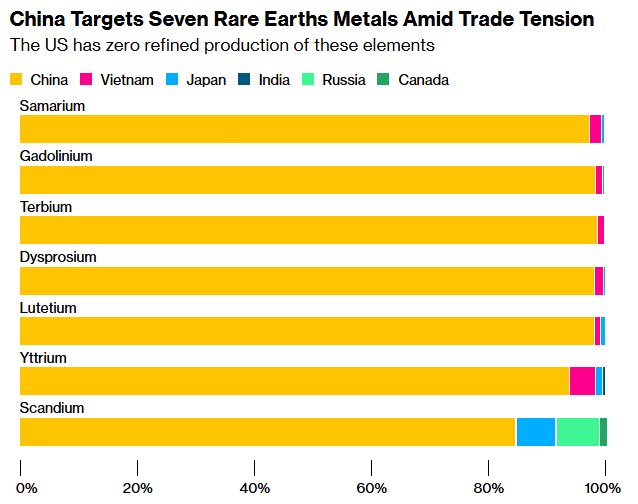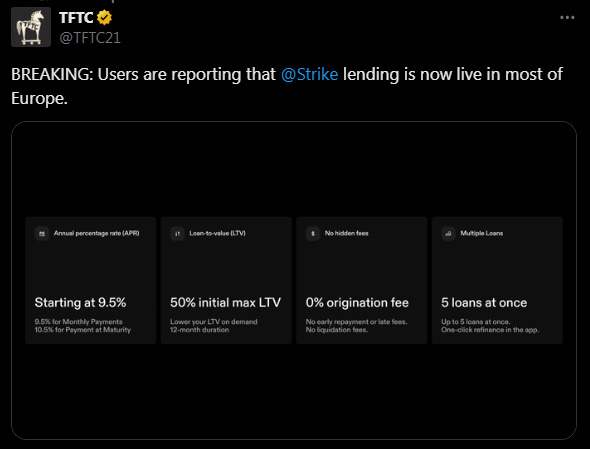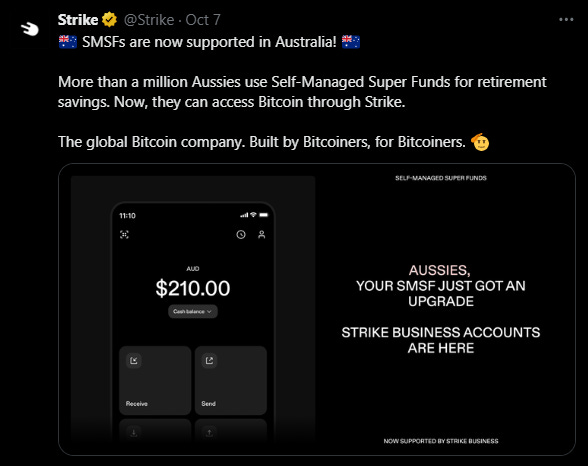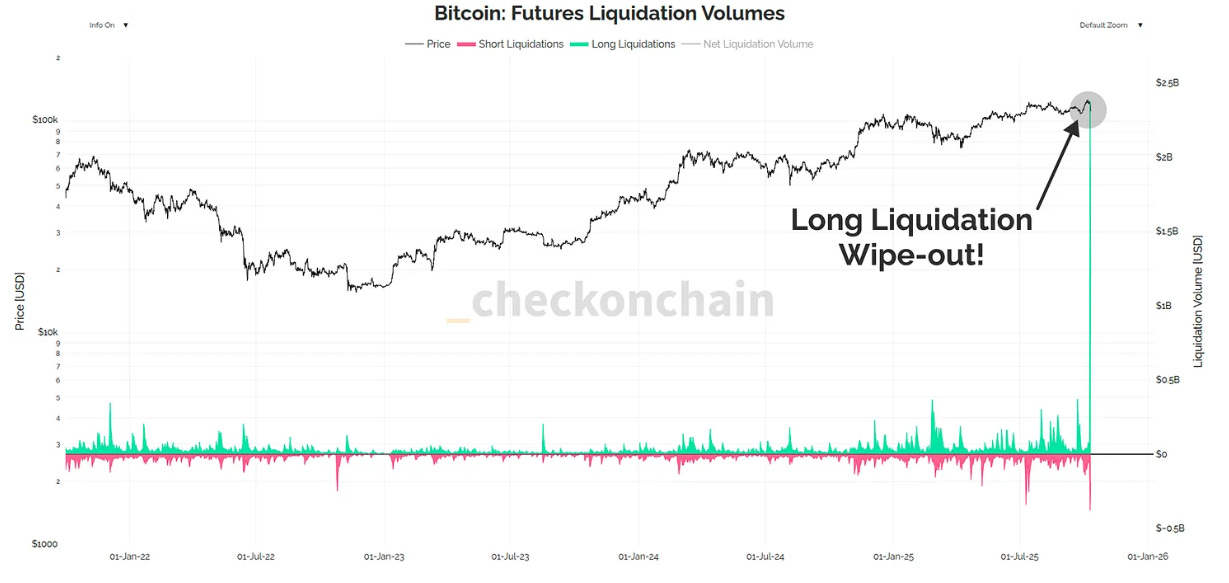Ten31 Timestamp 918,570
Well, that was fun while it lasted. After breaking through to a new all-time high north of $126,000, bitcoin pulled one of the largest Barts in its history Friday evening on the back of a sudden escalation in Strategic UncertaintyTM straight from the phone of the Commander in Chief. After months of market melt-ups lulling the world to sleep on the whole “global economic reordering” thing, President Trump shook everyone awake by declaring that he will slap an incremental 100% tariff on China while also subjecting the country to new controls on critical software in response to the Middle Kingdom’s significant tightening of rare earth metals exports. Opinions vary on the pace with which the US can realistically develop alternative capacity for sourcing rare earths – which it turns out are kind of important – but even in more optimistic cases, any meaningful tightness here could drive significant near-term headwinds to the AI capex story that has been a crucial lever to both US GDP and capital gains tax receipts. The President also suggested he’s calling off his long-anticipated direct meeting with Chinese President Xi Jinping later this month, which many investors had pegged as a positive catalyst into year-end, sending equity indices sharply lower to levels not seen since one whole month ago while nuking bitcoin all the way to ~$107,000 and sending the long tail of altcoins to money heaven. While we’re not ready to rule out a Sunday evening post walking it all back and sending everything limit up again, the episode highlights that the underlying tension introduced by the world’s ostensible hegemon outsourcing its critical defense and industrial base to its greatest geopolitical rival probably won’t be unwound without some more fireworks. We know where we want to be for the long run as this decoupling – and all the fiscal largesse it will require – takes shape, but we expect to see plenty more volatility on the road to the final destination.
Portfolio Company Spotlight
Satoshi Energy provides market-leading services and analytics for data center development projects bringing together high-performance compute projects, bitcoin mining operators, and power producers. The company offers plug and play power contracts and project monitoring services, as well as cutting edge tools for sites to manage credit exposure and real-time settlement of invoices. With a large pipeline of projects under development and a growing suite of products and services, Satoshi Energy is pioneering the accelerating convergence of power production and advanced data centers.
As the world’s largest investor focused entirely on bitcoin, Ten31 has deployed $200 million across two funds into more than 30 of the most promising and innovative companies in the ecosystem, and we expect 2025 to be the best year yet for both bitcoin and our portfolio. Visit ten31.xyz/invest to learn more and get in touch to discuss participating.
Selected Portfolio News
Satoshi Energy announced the initiation of 2.8GW of new AI data center projects:
Strike began rolling out its lending product in most European markets:
Strike also turned on lending in Louisiana, lowered minimums in several US states, and added support for Australian Super Funds:
Fedi shipped a major design upgrade to its mobile app:
Media
Ten31 Managing Partner Matt Odell led a conversation with Adam Back at this year’s Bitcoin Custody and Treasury Summit.
Ten31 Managing Partner Marty Bent joined the Bitcoin Frontier podcast to discuss the growing intersections between artificial intelligence and bitcoin.
Market Updates
After months of successive all-time highs and few bumps along the way, everyone was partying like it was 1999 coming into the week, with famed investor Paul Tudor Jones suggesting we’re on the cusp of a massive rally into a 2000-style blow-off top.
The good vibes weren’t isolated to the US, as the Japanese Nikkei index ripped nearly 5% to a new 52 week high on the election of Sanae Takaichi – a former ally of Shinzo Abe who appears ready to lean into growth-first policies – as the country’s next Prime Minister.
But once again, China rudely harshed everyone’s vibe by announcing extremely strict new rare earth metals controls on both the US and the rest of the world. Perhaps most significantly, Chinese trade officials indicated that exports intended for military applications generally will not be approved, and licenses for semiconductors or AI end use will be limited.
In response, President Trump reached deep into his Schrute Bucks bag and added another gazillion percent tariff on top of what China is currently paying, while noting that the US will ramp up its own export controls and add new restrictions on “any and all critical software.”
Trump’s latest trade missive also indicated he’s canceling his long-anticipated meeting with Chinese leader Xi Jinping scheduled for the APEC Summit later this month. However, he shortly thereafter suggested the meeting is still set to take place (for now).
As US-China tensions rip back to new highs after a relatively quiet summer, Treasury Secretary Scott Bessent announced an interestingly timed deal with Argentina, wherein the US will open up a new $20 billion swap line while directly purchasing Argentine pesos (officially giving us a Strategic Peso Reserve, exactly what most of us were hoping for early this year).
Notably, the arrangement seems explicitly targeted toward limiting China’s influence in the region while giving the US better access to some key raw materials that just got significantly more valuable.
Back on the domestic side of things, Secretary Bessent has reportedly narrowed the list of potential candidates to replace Jerome Powell as Fed Chair to five possible choices, including current Fed Governors Christopher Waller and Michelle Bowman, as well as Kevins Hassett and Warsh and BlackRock Fixed Income CIO Rick Reider.
We find it noteworthy (though not surprising) that all candidates have positioned themselves as particularly dovish, as a more accommodative stance from the Fed will become increasingly important against the backdrop of a US federal deficit that hit $1.8 trillion again for FY25. This figure is in line with last year, though largely thanks to some meaningful benefit from a spike in tariff receipts.
To be fair, the federal government is saving some money with the latest government shutdown, which has now dragged out for another full week. As of Friday, the Trump administration indicated that larger scale federal layoffs have begun, which may also be helpful to the budget on the margin…at least until the new unemployment claims and softer consumer spending data start rolling in.
Meanwhile, a dynamic that bears monitoring with the recent spike in volatility is the potential for increasing fragility in the private debt markets, as the fallout from the First Brands bankruptcy and general weakness in the “business development company” complex are contributing to an environment where more leveraged loan deals are getting pulled.
Bitcoiners got to join both the euphoria and the heartache this week, as the magic internet money reached a new all-time high above $126,000 on Monday only to lead the whole market down with an epic Friday afternoon massacre of historic proportions:
BlackRock’s IBIT had a monster week even despite the Friday drawdown, taking in 10% of net flows to all ETFs (though we’ll see how much of this reverses next week). After nearly two years of strong performance, the ETF now holds over 800,000 bitcoin.
Elsewhere on Wall Street, Morgan Stanley eliminated its restrictions on which high net worth client accounts can hold bitcoin funds and will now allow advisors to actively pitch these vehicles to any client. The massive asset manager also released a report recommending up to a 4% bitcoin allocation for some portfolios.
State Street, meanwhile, released new survey data indicating institutions expect to double their bitcoin holdings by 2028.
Regulatory Update
A Luxembourg sovereign wealth fund revealed it has made a 1% allocation to bitcoin, making the country the first Eurozone nation to openly add bitcoin to its national reserves.
Wyoming Senator Cynthia Lummis reiterated she is “working on” a de minimis tax exemption for bitcoin to reduce frictions associated with everyday bitcoin payments.
New reports out of Washington this week suggest talks on the Senate’s version of the “market structure bill” – which, most importantly, would include more explicit protections for noncustodial software developers – are stalling as some Senators seek to add much more adversarial language to the bill.
Noteworthy
Square terminals began allowing merchants to easily receive bitcoin payments while allowing vendors to convert up to 50% of daily revenue into bitcoin.
Popular prediction market site Polymarket announced it now supports bitcoin deposits.
The Nobel Committee named María Corina Machado – a longtime advocate of bitcoin as a check on authoritarian governments – as the latest Nobel Peace Prize Winner.
Travel
Labitconf, Nov 7-8







